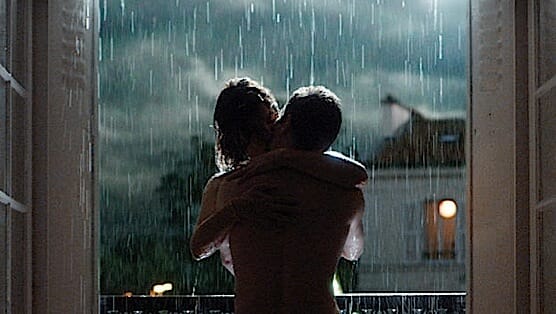The Blue Room
(2014 Beirut International Film Festival review)

At the movies, infidelity usually doesn’t turn out well. Whether in Fatal Attraction, Basic Instinct or Unfaithful, affairs possess an intoxicating thrill initially, but then everything goes to hell: relationships are destroyed, lives are shattered, the pet bunny gets it. So there should be little surprise that the French mystery The Blue Room, which concerns two married people involved in an illicit tryst, won’t find its way to a happy ending. But the mood it conjures up is nonetheless arresting. We don’t learn anything new about infidelity’s destructive, alluring power, but we’re reminded all over again in forceful fashion.
The movie, based on a Georges Simenon novel, has been adapted by director/cowriter/star Mathieu Amalric. The Blue Room opens with blood dripping from the lip of Amalric’s character, Julien, who’s just been bitten by his lover, Esther (Stéphanie Cléau), while in bed. The blood is a portentous but potent warning of what’s to come. The affair has gone on for a few months—long enough for a bond to form but not so long that the sex isn’t still white-hot—and the pair talk offhandedly about what it would be like to actually walk around in public as a couple, not hiding behind closed doors. With that as his film’s introduction, Amalric proceeds to jumble chronology, sometimes leaving us temporarily confused about where we are in time. The police question Julien about the death of Esther’s husband. The relationship between the four characters before the affair is established. Was the death an accident? Or murder? And who is the culprit?
Premiering at Cannes, The Blue Room opened in the United States the same weekend as Gone Girl, and it’s tempting to see slight similarities between the two films. Beyond their shifting perspectives and murder-mystery framework, the movies are also linked by their jaundiced view of romantic bliss, which they view as a temporary condition that inevitably leads to animosity, alienation or worse. But unlike David Fincher’s grand roller coaster of stylistic flourishes and cold-blooded craftsmanship, The Blue Room is determinedly modest and melancholy, tinged with a grim finality. Amalric’s characters are trapped in a box of their own making; when Julien and Esther move into their own separate box, it doesn’t get any better for them.
-

-

-

-

-

-

-

-

-

-

-

-

-

-

-

-

-

-

-

-

-

-

-

-

-

-

-

-

-

-

-

-

-

-

-

-

-

-

-

-








































